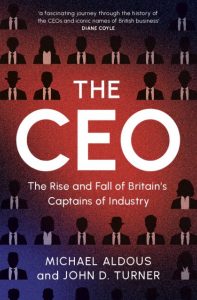I’d read The CEO: The Rise and Fall of Britain’s Captains of Industry by Michael Aldous and John Turner in proof form, to provide a quote and I just re-read it in physical form. It’s a very entertaining read, rooted in an impressive database the authors have compiled about the background and characteristics of chief executives – almost all men, though time and still now.
The book is then structured broadly chronologically, using the data to characterise waves of approaches to management and corporate governance. In the earliest days of the corporation as it emerged in modern form, aristocrats were generally in charge, with varying degrees of success. This gave way to founder- and family-led firms. Postwar came the managerial revolution, when at a time of increasing social mobility talented men were able to rise from the shop floor to the boardroom. The chapter on the 1980s is titled ‘The Buccaneers’ and then the book moves on to the Fat Cats, featuring the privatisations of the 90s (many people my age will remember Cedric the pig), and the subsequent attempt to introduce higher standards of corporate governance through the Cadbury code. Each chapter is shaped round characteristic examples, be it British Leyland or Slater Walker.
The authors are sceptical that such codes have done anything to moderate boardroom excess, and scathing about the spread of financialisation and the private equity asset-stripping model. So this is far from a tale of progress – more a story of how British companies managed to fail in every era. For example, UK plc remained highly sceptical about having graduate managers and lagged far behind the educational qualifications of German, Japanese or US executives. The same for specialist management education – Wharton was founded in 1881, Harvard Business School in 1908, but London Business School not until 1964 and Manchester Business School in 1965.
Along with this historical panorama there are many wonderful facts. Who has heard of John Ellerman, shipping magnate, who died in 1933 worth £13.8bn in today’s money? Who knew that James Hanson had been engaged to Audrey Hepburn, before she broke it off after filming Roman Holiday? So this is a very enjoyable book as well as raising serious questions about management quality in the UK, which seems to be a consistent problem.

